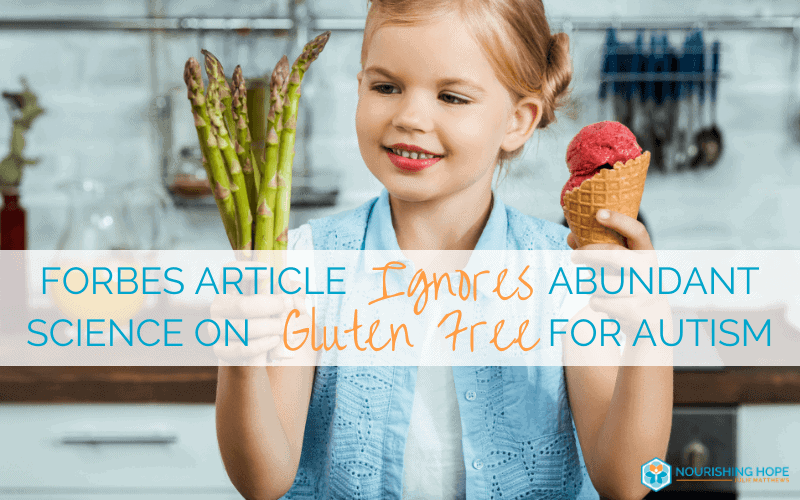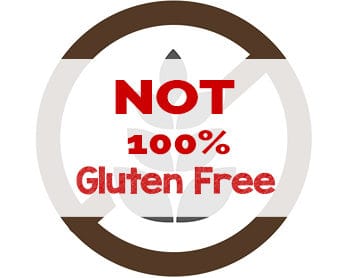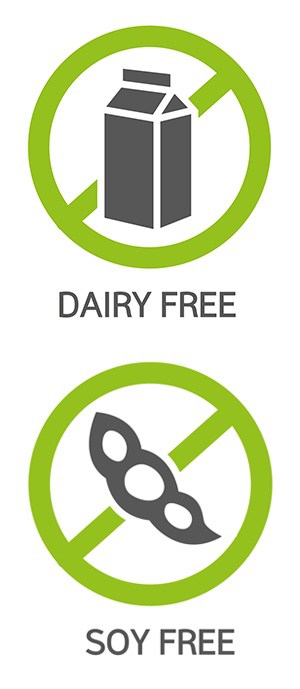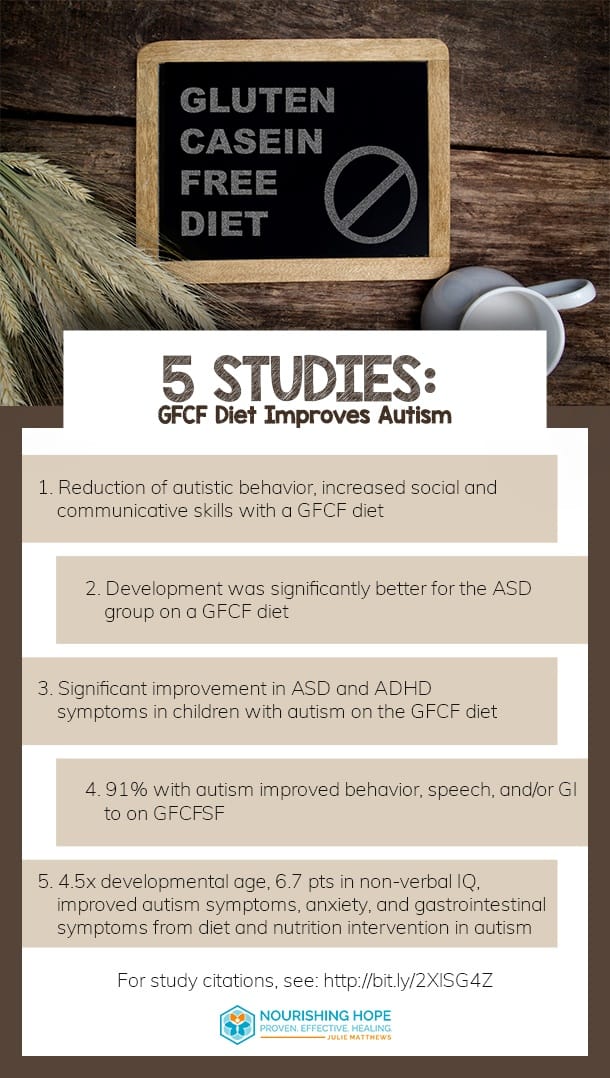
This week an article was published in Forbes, disparaging the use of the gluten-free diet for autism – a healthful approach that has benefited thousands of families around the world for decades.
The author’s “bent” seems to be to discourage parents of children with autism from giving needed attention to the food and nutrition their children receive.
He states, “The science behind the idea that gluten or casein causes (or worsens) autism has always been sketchy.”
I so often hear there is “no science” or “little science”… or “weak” science, as this Forbes article states “weakly supportive evidence for this idea [following the gluten-free diet].”
When I see this claim of “no science” I know they have clearly not done the research because if they did they’d find dozens of studies that support the efficacy of dietary intervention for autism. (We’ll talk about some of them in a moment.)
I do what I do (write and speak), in part, because of these naysayers. I’m a Certified Nutrition Consultant who has worked with children with autism for 17 years. I’m a published nutrition researcher (with a study on diet and nutrition intervention for autism). And I’m a writer (author of Nourishing Hope for Autism and an online nutrition program for parents) that brings together the research and clinical results to help parents and health professionals distill the science and practice into things they can do to help children improve their health, learning, and behavior.
And I write and speak to not only help parents and practitioners learn how to help children, but also to give these parents a voice. A voice of the science and a voice for their experience and passion to help their child holistically and nutritionally.
The recent Forbes article is simply the latest hit piece on dietary intervention for autism.
Each year I see them. A study will come out showing diet does not help and another study showing that it does. The study showing benefit is often well designed and written but it gets no attention. And the study showing diet does not help gets all the press.
Why is this?
Why is it that the media is much more likely to jump on a story showing that diet does not help autism, than when it does?
Why squash all hope? I may never understand this.
At Nourishing Hope we are here for the opposite… to share the science AND nourish hope for families that there are things that can help.
It’s solid science and it is certainly worth trying.
Let’s get into the article.
In this Forbes piece, the author, Steven Salzberg, a computer scientist, claims there hasn’t been a good study until now, saying…
“virtually no good studies have asked the question, do gluten-containing foods actually cause the symptoms of autism?”
That’s not true. There were a number of respected studies before this on gluten-free alone and many more on gluten and dairy. A quick Pub Med search brings up this study “ A Gluten-Free Diet as an Intervention for Autism and Associated Spectrum Disorders: Preliminary Findings”1 showing positive results way back in 1999.
The Old Switcheroo
Whether this is intentional or unconscious I’m not sure. But this is a common tactic many people use… Comparing apples to oranges.
The author states,
“However, there are plenty of websites that offer treatments for autism, many of them unproven. One of the more common claims is that autistic children will benefit from a gluten-free, casein-free diet.
But then he goes on to discuss only “gluten-free diets” which is not the primary dietary recommendation for those with autism. It is the gluten-free and casein-free diet (GFCF) these parents are following and seeing results from, not an ONLY gluten-free diet.
He doesn’t consider or present any evidence on gluten-free AND casein-free diets. There is a vital distinction we’ll discuss when we talk about the study flaws.
When he switches the conversation from gluten-free and casein-free to gluten-free only, he’s comparing apples to oranges.
But first, more about the study.
One Study
The author only looked at one study2 to determine his primary scientific argument. He states:
“The new study, just published in the Journal of Autism and Developmental Disorders, is the first randomized, well-controlled study of gluten-free diets in children with autism.”
No, it’s not the first (more studies below), and it was not well controlled.
Let’s look at the study (you can read the full text paper here).
The study had 66 children who were all on a gluten-free diet.
They were randomly assigned to the gluten-free diet (GFD) group or the gluten diet (GD) group. The gluten-free diet group continued to eat a gluten-free diet once the study started. The gluten diet group consumed one gluten containing food in more than one meal per day.
Flaws with the study
This article is based primarily on this one new study, which is fundamentally flawed in two ways.
1. The gluten free diet was not gluten-free
The study allows for infractions…
 “An incidental episode of consumption of a gluten-containing food (defined as a small piece of gluten product, e.g., bun or cake) or the consumption of yoghurt or spices with infinitesimal amounts of gluten was still classified as being compliant with the GFD.”
“An incidental episode of consumption of a gluten-containing food (defined as a small piece of gluten product, e.g., bun or cake) or the consumption of yoghurt or spices with infinitesimal amounts of gluten was still classified as being compliant with the GFD.”
This is not a gluten-free diet to begin with. A biochemical response to gluten can occur from a very small infraction, the allowance of a “small piece of gluten product,” or even the small amount found in spices is definitely enough to cause a reaction.
Since there was enough gluten to physiologically cause a reaction the study was not testing no gluten vs. gluten. It was actually testing a little gluten vs. more gluten, and this is very different. I’d expect not to see any/much difference between these two groups.
Moreover, they don’t state how many infractions are allowed. We don’t know if they are happening daily or weekly. Regardless, even just a single infraction could throw things off for weeks, if not months.
So the study cannot measure the impact of the omission of gluten. And this diet would not be able to determine the difference between gluten and gluten-free results.
2. Dairy and Soy

The greatest flaw is that the diet discussed, a gluten-free diet, is not what’s being recommended by educated and experienced parents and professionals for autism. The science supports following a gluten-free AND casein-free diet.
That’s because casein, a protein in dairy (and soy too) share similar food proteins and properties to gluten (and similar scientific reasoning for removing them from the diet). Without omitting all three, you might not see any beneficial results.
This is because gluten and casein (and even soy) are broken down by the same digestive enzyme (DPPIV). So a deficiency with the enzyme can cause a reaction to all three foods. They are also inflammatory foods that are difficult for many people to digest. And all three have a partially-digested peptide that fits in the opiate receptor mimicking opiates. (I’ll explain more below)
Removing one may not result in any benefit.
In the Forbes article, the author quotes the lead researcher as saying, “There is no evidence either against or in favor of gluten avoidance for managing symptoms of ASD in children.”
I couldn’t find that quote in the paper, which concerns me on the legitimacy of the reporting. But either way, this statement is just wrong. Any pub med search will show you that there is plenty of research (which we will get into in this article).
Parent’s Reporting of Their Experience Matters
The author’s only mention of any past research was a single paper on parent interviews, which he defines as “weakly supportive evidence” and “notoriously unreliable.”
While parental surveys/interviews have their limitations – I disagree about their value. Parents know their children better than anyone. In that way, they can offer astute observations of changes in their child, and provide helpful data.
And more importantly, this is only one paper. There are many more studies showing that a gluten-free and casein-free diet can help children with autism, and many that are more solid and well designed.
Studies that show the GFCF diet helps children with autism
Here are five studies showing that diet improves symptoms in autism:
- Showed a reduction of autistic behavior, increased social and communicative skills with a GFCF diet, and reappearance of autistic traits after the diet has been broken 3
- Found development was significantly better for the ASD group on a GFCF diet 4
- Demonstrated significant improvement in ASD and ADHD symptoms in children with autism on the GFCF diet 5
- Found 91% with autism improved behavior, speech, and/or GI to on GFCFSF 6
- Measured 4.5x improvement in developmental age, 6.7 pts increase in non-verbal IQ, improved autism symptoms, anxiety, and gastrointestinal symptoms from diet and nutrition intervention in autism. Same study found statistically significant benefits in communication, social interaction, daily living skills, inattention, and hyperactivity. (This study also included several nutritional supplements in addition to a healthy GFCFSF diet.) 7

The Science Behind Diet for Autism
As I mentioned at the beginning, the article states:
“The science behind the idea that gluten or casein causes (or worsens) autism has always been sketchy.”
This is not true… the science is not sketchy.
Let’s talk science…
Children with autism routinely exhibit physical symptoms; such as diarrhea, constipation, bloating and GI pain, frequent infections, food allergies, sleeping challenges, and inflammation/ pain. For many children, nutrient deficiencies, imbalanced biochemistry, digestive problems, and inflammation underscore these symptoms.
Taking charge of their diet and nutrition can help.
One strategy is to follow a healthy gluten-free, casein-free, and soy-free diet.
Let’s discuss why the gluten-free and dairy-free diet can help.
What children eat affects how their body and brain operate for several reasons: the chemicals and substances in foods can affect the brain, and the foods we digest become nutrients for the brain to function.”
Nutrients are essential to all biochemical and brain function. Adequate nutritional status requires the consumption of nutrient dense food and proper digestion to breakdown and absorb those foods. Poor digestion can lead to a condition known as leaky gut; marked by malabsorption of nutrients, inflammatory responses to foods that are not broken down, and a burden to the detoxification system.
Poor digestion often stems from environmental factors (as well as genetic susceptibility), lack of beneficial bacteria, inflammation, and immune system response to certain foods. And studies have shown leaky gut 8, low levels of beneficial flora9, inflammation and immune response to food 10, 11 in children with autism. Additionally, the response to certain foods such as gluten and casein can create an opiate or inflammatory reaction that can affect the brain.
Gluten & Casein – Possible Opiates
Certain foods, such as wheat and dairy, contain proteins (gluten and casein) that can form opiate compounds if they are not properly digested. They fit in the opiate receptors of the brain and mimic other opiates like morphine12. This opiate effect can directly influence the brain and result in symptoms similar to morphine—foggy thinking, inattentiveness, constipation, and more.
And there are a number of studies on the opiates in autism 13, 14, 15, a decrease in GI symptoms on a GFCF diet16, and a reduction in autistic symptoms with a GFCF diet 17, 18, 19.
As a parent addresses matters within their control, i.e. their child’s diet, nutrition, and lifestyle, they are literally supplying the body the nutrients and condition it needs to heal. Improving these underlying factors influences the trajectory of disorder and leads to better overall health and well being, and subsequently improved learning and behavior.
Misleading Inference – Diet and Vaccines?
You’d be amazed at how “controversial” DIET for children with autism is.
That’s because so many people make it about vaccines. Which it is not. And this author does the same.
“The push for diet-based treatments has its origins in the anti-vaccine movement, beginning with… Andrew Wakefield”
Oh boy, here we go. Hey, author, your bias is showing.
Do not politicize these poor children. Children are suffering. They need help.
This is about gastrointestinal, neurological, and nutritional science. Let’s figure out what’s going on and how we can improve the quality of life and their potential.
Using Andrew Wakefield as the reason why diet doesn’t work is what’s really weak in this article.
The first observation by a doctor that a gluten-free and casein-free diet could help children with autism was done 40 years ago, well before Andrew Wakefield was on the scene.
The science of nutrition for autism is clear and has nothing to do with Andrew Wakefield or the “anti-vaccine movement.”
The Science is in and the Discussion is Over
That’s what this author wants you to believe…
He writes,“This study should put to rest all of the claims that a gluten-free diet can somehow improve the symptoms of autism.”
ONE study!. One flawed study should “put to rest all of the ‘claims’” and the research and clinical experience?
That’s silly.
That’s not the scientific method. Putting to rest an entire intervention based on one poorly designed study is foolhardy.
Unless your objective is less about finding the scientific answers and more about pushing a narrative.
In the end, it concludes with,
“But let’s hope that parents get the message: don’t feed your autistic child a restricted diet.”
He hopes he’s taken away hope?
That’s terrible.
I’d be happy to talk with Steven Salzberg anytime to share the science on this subject. And I’d even be open for debate. Maybe Joe Rogan (my favorite podcaster) will have us both on to discuss the science of why and how diet helps children with autism improve.
Nourishing Hope
 I founded Nourishing Hope to stand for the efficacy of improved diet and nutrition for autism.
I founded Nourishing Hope to stand for the efficacy of improved diet and nutrition for autism.
In my book, Nourishing Hope for Autism, my websites, and programs, I give hundreds of scientific references to support the scientific rationale for making improvements to diet and nutrition. I also provide detailed “how to” guidance to encourage success.
And routinely, when families give it a try, they find it beneficial and worth the effort.
If you’re a parent, I’m here to say, keep nourishing hope.
It is possible that improving diet and nutrition can help your child.
Children can and do get better, and with 1 in 59 children affected by autism, THAT’s what Forbes should be writing about.
Share your story
Parents (and practitioners), share your comments.
Show the naysayers that diet can help, and provide families hope.
With your comments AND the science on your side, maybe they will finally hear us.
Did a gluten-free, dairy-free or other diet help improve your child’s life?
Please share your story (leave a comment below) with other parents looking for hope and help.
- Whiteley, P., Rodgers, J., Savery, D., & Shattock, P. (1999). A gluten-free diet as an intervention for autism and associated spectrum disorders: preliminary findings. autism, 3(1), 45-65.
- Piwowarczyk, A., Horvath, A., Pisula, E., Kawa, R., & Szajewska, H. (2019). Gluten-Free Diet in Children with Autism Spectrum Disorders: A Randomized, Controlled, Single-Blinded Trial. Journal of autism and developmental disorders, 1-9.
- Knivsberg AM, Reichelt KL, Nodland M. (2001) Reports on dietary intervention in autistic disorders. Nutritional Neuroscience, 4(1):25-37.
- Knivsberg AM, Reichelt KL, Hoien T, Nodland M. (2002) A randomised, controlled study of dietary intervention in autistic syndromes. Nutritional Neuroscience, 5(4):251-61
- Whiteley P, Haracopos D, Knivsberg AM, Reichelt KL, Parlar S, Jacobsen J et al. The ScanBrit randomised, controlled, single-blind study of a gluten- and casein-free dietary intervention for children with autism spectrum disorders. Nutr Neurosci 2010; 13(2): 87-100.
- Jyonouchi, Harumi, Sining Sun, and Nanae Itokazu. “Innate immunity associated with inflammatory responses and cytokine production against common dietary proteins in patients with autism spectrum disorder.” Neuropsychobiology 46.2 (2002): 76-84
- Adams, J., Audhya, T., Geis, E., Gehn, E., Fimbres, V., Pollard, E., … & Matthews, J. (2018). Comprehensive nutritional and dietary intervention for autism spectrum disorder—A randomized, controlled 12-month trial. Nutrients, 10(3), 369.
- D’Eufemia P, Celli M, Finocchiaro R, et al. Abnormal intestinal permeability in children with autism. Acta Paediatr. 1996 Sep;85(9):1076-9.
- Finegold SM et al. Gastrointestinal microflora studies in late-onset autism. Clin Infect Dis 2002 35(Suppl 1):S6-S16.
- Jyonouchi H, et al. Proinflammatory and regulatory cytokine production associated with innate and adaptive immune responses in children with autism spectrum disorders and developmental regression. J Neuroimmunol. 2001 Nov 1;120(1-2):170-9.
- Jyonouchi H, Sun S, Itokazu N. Innate immunity associated with inflammatory responses and cytokine production against common dietary proteins in patients with autism spectrum disorder. Neuropsychobiology. 2002;46(2):76-84.
- Zioudrou, Christine, Richard A. Streaty, and Werner A. Klee. “Opioid peptides derived from food proteins. The exorphins.” Journal of Biological Chemistry 254.7 (1979): 2446-2449.
- Jinsmaa Y, Yoshikawa M. (1999) Enzymatic release of neocasomorphin and beta-casomorphin from bovine beta-casein. Peptides, 20:957-962.
- Reichelt KL, Knivsberg AM, Lihnd G, Nodland M: Probable etiology and possible treatment of childhood autism. Brain Dysfunction 1991; 4: 308-319.
- Shattock P, Whiteley P. (2002) Biochemical aspects in autism spectrum disorders: updating the opioid-excess theory and presenting new opportunities for biomedical intervention. Expert Opin Ther Targets. Apr;6(2):175-83
- Jyonouchi H, Geng L, Ruby A, Reddy C, Zimmerman-Bier B. (2005) Evaluation of an association between gastrointestinal symptoms and cytokine production against common dietary proteins in children with autism spectrum disorders. J Pediatr. May;146(5):582-4.
- Knivsberg AM, Reichelt KL, Nodland M. (2001) Reports on dietary intervention in autistic disorders. Nutritional Neuroscience, 4(1):25- 37.
- Knivsberg AM, Reichelt KL, Hoien T, Nodland M. (2002) A randomised, controlled study of dietary intervention in autistic syn- dromes. Nutritional Neuroscience, 5(4):251-61
- Whiteley P, Haracopos D, Knivsberg AM, Reichelt KL, Parlar S, Jacobsen J et al. The ScanBrit randomised, controlled, single-blind study of a gluten- and casein-free dietary intervention for children with autism spectrum disorders. Nutr Neurosci 2010; 13(2): 87-100.




When my son truly descended into autism at age 2, I described it like he was slowly poisoned. He vomited for no reason, had chronic diarrhoea, he lost all interest in his surroundings and people. I had the good fortune that one of the first professionals I took him to was a MD, Maps doctors and Gaps practitioner.
The first thing we did was diet. We removed all casein, gluten, soya and sugar from his diet. If we needed proof of the opiate like affects of gluten and casein we saw it in the first week. He was like a drug addict looking for his fix, even searching the bin for anything with wheat in it! Thankfully we got through it. He became calmer, had better eye contact, his eczema completely cleared, he stopped getting sick, his bowel movements improvements but not as much as we wanted.
After a year, we went onto the Gaps diet to really fix his gut. He began having normal stools for the first time in his life!! We were able to toilet train him quickly. He went from his very restricted beige diet at age 2 to a 4 year old who helps me juice organic fruit and veg every morning. He eats the rainbow now.
He still struggles with his autism but we have a far happier, healthier, fun loving child now. Our quality of life greatly improved because of nutritional work.
We have and continue to do alot of therapies but nothing thus far has improved my child’s life and our family’s life more than diet.
You know that this writer had their mind made up before even starting this article of whether they believed in nutritional intervention. Did the author take the time to speak to anyone in the autism community?
If I had read this article and taken it as well researched, I could have missed the opportunity to greatly improve my autistic child’s life.
If this author walked a day in our shoes….
Don’t speak of something you know nothing about or even researched well.
Since the removal of dairy products and wheat products from my child diet, his overall health, behavior and social interaction has improved. Foods do affect our bodies.
Oh yes, nutrition does matter!
Summer before last I had my granddaughter to tutor.
She was last in her class(1st).
She is a beautiful sweet girl but just zoned.
Teachers told my daughter, children like this never change.
I had her for about 5 weeks.
I detoxed her while cutting out gluten and most dairy.
I taught her for like… 30 mins 4 days a week for those 5 weeks.
When my daughter came and picked her up, the haze was gone from her eyes, she no longer grunted instead of talking, she was retested(same test she had when she left school) and now Aced the test! … And the teacher apologized to my daughter because she had never seen this happen to a child before.
Nutrition, suppliments, detox, no gluten and limited dairy.
Thank you for your rebuttal to this unfortunate article. As a parent of a child on the spectrum, I can say that many dietary interventions, including a GFCFSF diet, have helped my son immensely. As per the usual, main stream media is ignoring the abundant amount of science “on our side”, and ignoring parents who witness their children’s behavioral and physical changes (sounds like another area that I won’t mention here). I personally think the problem is that there is no money for big pharma to make in a “cure”, when a healthy diet is used to help and heal the body. So, they will do what they can to debunk actual science. Bravo for your response and for your amazing work. Parents: you can help heal your child with nutrition, there is hope. It may not be easy, but it is totally worth it!
I love you and the work that you do to help families. I have implemented the GFCFSF diet in my practice. Especially, in working with Early Intervention Children with special health needs.. I have developed a reputation in the St. Louis market for helping children heal but in Il where I live, I am met with resistance.
Simply said, your interventions /program works.
I have a well-nourished thirteen year old daughter as proof . She was born prematurely and later diagnosed with ADHD and sensory processing disorder.
Keep doing what you . You are an awesome teacher.
Keep hope alive!
Michelle Hoover
MA, RDN